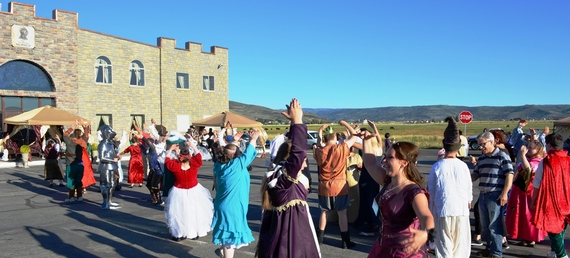In the attempt to provide employment for people with intellectual disabilities, the need for assistance involves YOU. Of course, cooperation from businesses is important, but help from laypeople is critical if we are to improve the quality of life of some of our communities' most loyal and loving members. Employment for people with intellectual disabilities is about a lot more than you might think. In most cases, it's not about the need for money. People with intellectual disabilities are eligible for government benefits such as Social Security, Medicare and Medicaid. No. Employment for people with intellectual disabilities is about something far more important than money.
I recently attended The Kingdom Ball, an annual event hosted by a local business for intellectually challenged teens, young adults and their families. Invitees attend the dinner and parking lot dance dressed in garb from medieval and renaissance times. Siblings that do not have special needs also attend the event, which is held in front of a manufacturing plant that looks like a medieval castle. These awesome teens and young adults keep the people who do have special needs dancing and participating. That is the key.
The Kingdom Ball is about making sure that people with intellectual challenges are involved in an event that is not segregated. People with special needs who attend the dinner-dance feel like it is a community event that they happen to participate in, rather than something created for them because they are different. I noticed a recurring theme of discussions this year at The Kingdom Ball. Parents and caregivers talked again and again about the difficulties their children have as they reach and age where they can no longer participate in public education (in my state the age is twenty-two). Most of them end up in programs where they are segregated off to spend the majority of their time amongst others with special needs. These programs are not representative of community demographics. They are not natural. They don't feel right to people with intellectual disabilities, or to any other reasonable people.
We have seen great success with inclusion programs in our education system, but integrating these successes into the employment world have been very limited.
Over the past few decades, our society has done very well at inclusion programs where students with intellectual disabilities are allowed to participate with their more fortunate peers, on whatever level they are capable. During parts of the school day where students with intellectual disabilities are capable of participating on even basic levels, they find themselves singing in music classes, learning physical education, acquiring home economic skills and eating lunch with peers who have no disabilities. These students with special needs find themselves in situations that represent the demographics of their community. That is natural. It works for everyone. And students that don't have special needs become close to their friends who don't progress as quickly, nor advance as far. We have seen great success with inclusion programs in our education system, but integrating these successes into the employment world have been very limited.
I thought I had the problem solved for two of my children who have intellectual disabilities, by making places for them in our family owned business. That worked very well for my daughter. Work colleagues, who don't have intellectual disabilities, made her their friend. They helped her learn her job. They take her with them to movie nights and other after-work activities. My daughter is in an atmosphere that represents community demographics. She feels like she is "normal" (whatever that means). My daughter's coworkers are awesome. They have risen to the opportunity to make someone's life more fulfilling. They go far beyond what would be expected. Still, I believe that most people would rise to such an occasion, given the opportunity. The problem for me came when my son, who has Down syndrome, told me that he didn't want to work in the family business.
Including people with intellectual disabilities in the workplace is not a situation of one-sided benefits.
Jack wanted to work at the local grocery store. He either wanted to be a cashier or a bagger. Management for the store stepped up to the plate and pounded the pitch out of the park. Paraprofessionals from Jack's school, management and other workers at the grocery store began helping him prepare for a career that focuses on one of his greatest strengths. My son is a real people person. Bagging at a grocery store allows him constant contact with the community that he loves just as much as it loves him. The biggest challenge with Jack in his job training has been keeping the line moving. He loves to talk to the customers (his "friends") and they love to talk to him. Including people with intellectual disabilities in the workplace is not a situation of one-sided benefits. If we deprive ourselves of contact with people who have intellectual disabilities and thereby miss what they can teach us, we will deprive ourselves of some of life's greatest lessons.
Of course, intellectual disabilities are just that. There are certain things that people who have these challenges simply can't do, due to safety or other reasons. There are places in the workplace where it is not appropriate for them to participate. Reasonable limits depend on the challenged individual, the job and other variables. Even so, these limits should be set by the intellectual condition, and not before. The problem for people with intellectual disabilities comes when we limit them more than their condition does. That simply isn't fair.
The true and genuine emotions worn on the sleeves of people with intellectual disabilities, is a breath of fresh air.
I believe that often times, businesses with available positions that could do the most for people with intellectual disabilities (and the communities who love them) shy away. They avoid putting these people with intellectual challenges into places where they have contact with the general public for fear of customers feeling uncomfortable. I'll tell you what makes me feel uncomfortable: It's a workplace society that is not natural and not reflective of community demographics. On the other hand, a young busboy with Down syndrome shaking my hand because he is genuinely glad to see me makes my day. If he pats me on the back as I walk away, because he truly values me as one of his friends (rather than just a customer), my day and my life will be just a little bit brighter. The true and genuine emotions worn on the sleeves of people with intellectual disabilities, is a breath of fresh air.
If you feel the same way about including people with intellectual challenges in the workplace, your help is needed. When you notice places of business and employment positions where people with intellectual disabilities might fit in, take a few minutes to write a letter to management. Encourage these businesses to employ people with intellectual challenges. Let them know that you are not comfortable with unnatural representations of community demographics in the workplace. Help them to understand that we want our less fortunate friends included in the community on whatever level they are capable of participating. We have had great success with inclusion programs within our public education system. That success has made the world a better place. It is time that we take another step forward. We need to make these inclusion programs for people with intellectual disabilities as prevalent in the workplace as they have been in our public education system.
Follow John M. Simmons on his blog


